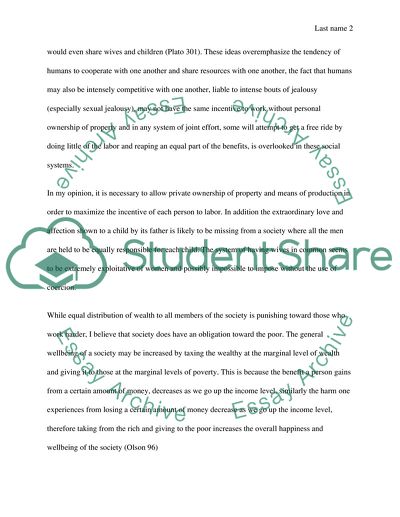Cite this document
(“My Ideas for a Utopia Essay Example | Topics and Well Written Essays - 1500 words”, n.d.)
My Ideas for a Utopia Essay Example | Topics and Well Written Essays - 1500 words. Retrieved from https://studentshare.org/creative-writing/1567116-the-utopia-essay-construct-your-ideologyphilosophysocial-contract-and-justify-it-should-be-based-on-the-ideas-of-plato-rousseau-from-the-social-contract-marx-the-communist-manifesto
My Ideas for a Utopia Essay Example | Topics and Well Written Essays - 1500 words. Retrieved from https://studentshare.org/creative-writing/1567116-the-utopia-essay-construct-your-ideologyphilosophysocial-contract-and-justify-it-should-be-based-on-the-ideas-of-plato-rousseau-from-the-social-contract-marx-the-communist-manifesto
(My Ideas for a Utopia Essay Example | Topics and Well Written Essays - 1500 Words)
My Ideas for a Utopia Essay Example | Topics and Well Written Essays - 1500 Words. https://studentshare.org/creative-writing/1567116-the-utopia-essay-construct-your-ideologyphilosophysocial-contract-and-justify-it-should-be-based-on-the-ideas-of-plato-rousseau-from-the-social-contract-marx-the-communist-manifesto.
My Ideas for a Utopia Essay Example | Topics and Well Written Essays - 1500 Words. https://studentshare.org/creative-writing/1567116-the-utopia-essay-construct-your-ideologyphilosophysocial-contract-and-justify-it-should-be-based-on-the-ideas-of-plato-rousseau-from-the-social-contract-marx-the-communist-manifesto.
“My Ideas for a Utopia Essay Example | Topics and Well Written Essays - 1500 Words”, n.d. https://studentshare.org/creative-writing/1567116-the-utopia-essay-construct-your-ideologyphilosophysocial-contract-and-justify-it-should-be-based-on-the-ideas-of-plato-rousseau-from-the-social-contract-marx-the-communist-manifesto.


